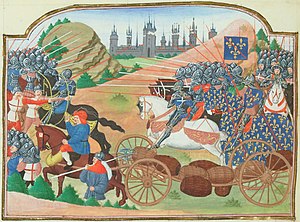
Back معركة الرنجة (الرنكة) Arabic Битка на херингите Bulgarian Batalla de les arengades Catalan Bitva o slanečky Czech Schlacht der Heringe German Batalo de la haringoj Esperanto Batalla de los Arenques Spanish Journée des Harengs French Ծովատառեխի ճակատամարտ Armenian Pertempuran Herrings ID
This article needs additional citations for verification. (February 2018) |
| Battle of the Herrings | |||||||
|---|---|---|---|---|---|---|---|
| Part of the Hundred Years' War (1415–53 phase) | |||||||
 Illumination adorning La Cronicque du temps de Tres Chrestien Roy Charles, septisme de ce nom, roy de France by Jean Chartier, c. 1470–1479 | |||||||
| |||||||
| Belligerents | |||||||
|
|
| ||||||
| Commanders and leaders | |||||||
|
|
| ||||||
| Strength | |||||||
| around 4,000 | 1,600[1] | ||||||
| Casualties and losses | |||||||
| 500–600 | Unknown but presumably light | ||||||
The Battle of the Herrings, also called the Battle of Rouvray, was a military action near the town of Rouvray in France, just north of Orléans, which took place on 12 February 1429, during the siege of Orléans in the Hundred Years' War. The immediate cause of the battle was an attempt by French and Scottish forces, led by Charles of Bourbon and Sir John Stewart of Darnley, to intercept a supply convoy headed for the English army at Orléans. The English had been laying siege to the city since the previous October. This supply convoy was escorted by an English force under Sir John Fastolf and had been outfitted in Paris, from whence it had departed some time earlier. The battle was decisively won by the English.
According to Régine Pernoud, the supply train consisted of "some 300 carts and wagons, carrying crossbow shafts, cannons and cannonballs but also barrels of herring". The latter were being sent since the meatless Lenten days were approaching. It was the presence of this stock of fish which would give the somewhat unusual name to the battle.
- ^ Wavrin 1891, pp. 162, 164–5.
© MMXXIII Rich X Search. We shall prevail. All rights reserved. Rich X Search